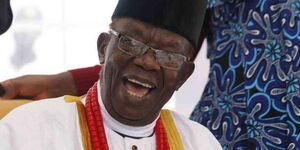Kenya can ease its debt burden if it adopts proposals by major credit rating agency, Moody’s, are to be adopted.
The agency is of the view that by developing an environment where governments, corporations, and other entities can borrow money by issuing bonds or other debt instruments in the local currency, Kenya can ease its debt burden and protect itself from global shocks.
By doing this, Kenya will create a liquid local debt market in its currency, shielding it from global volatility such as that was brought by tariffs imposed by US President Donald Trump and fickle foreign investors, who impose strict guidelines on loans.
Speaking to Reuters, Moody’s global head of sovereign and sub-sovereign risk, Marie Diron, cited countries such as Benin and Ivory Coast, which have beefed up their local funding and are fairing well.
"Domestic funding, I think that has to bridge that gap," she told Reuters in an interview on the sidelines of an event by the Mo Ibrahim Foundation in Marrakech, Morocco.
She also gave the example of South Africa, noting that their deep and liquid domestic debt markets had in part shielded South Africa's credit rating, and borrowing costs despite the strong stand taken against the African nation by Trump.
Through issuing debt in local currency, Kenya can guarantee financial stability and avoid risks associated with borrowing in foreign currency, such as a rising debt burden associated with fluctuating exchange rates.
It will also assist in attracting investment opportunities, improve economic development, and enhance monetary policy effectiveness.
Aside from having a liquid debt market, Moody’s also proposed using revenue efficiently, lowering exposure to foreign currency debt, and lengthening maturities, adding that it positively influenced the credit ratings and market access of countries.
The latest comes after Auditor General Nancy Gathungu revealed that the government paid Ksh6.6 billion as commitment fees on undrawn loans procured from foreign lenders.
Gathungu made the revelation before the Budget and Appropriations Committee (BAC) of the National Assembly, with MPs questioning Treasury’s commitment to prudent management of the “limited” public funds.
As per Gathungu, the government paid the penalties between the 2020/2021 and 2023/2024 financial years, at a time the country continues to experience shortfalls in funds to finance critical expenditures like school capitation.
It emerged that of the Sh515.1 billion that was borrowed to finance 14 projects, Sh304.4 billion had not been spent. According to Ms Gathungu, some of the projects were about to lapse before completion.
Currently, Kenya's public debt stands at Ksh11 trillion. Of this, Ksh5 trillion comprises domestic debt, while Ksh5.09 trillion accounts for external debt. Domestic debt largely consists of Treasury Bills and Bonds, whereas external debt is owed to multilateral, bilateral, and commercial creditors.












